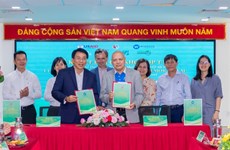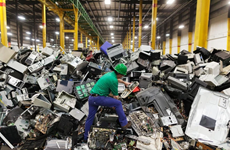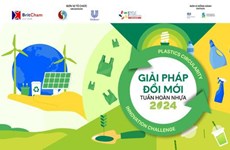Regional workshop examines solid waste management
The United Nations Economic and Social Commission for Asia and the
Pacific (ESCAP) launched a regional workshop in the central province of
Binh Dinh on September 24 focussing on pro-poor and sustainable solid
waste management in secondary cities and small towns.
The United Nations Economic and Social Commission for Asia and the
Pacific (ESCAP) launched a regional workshop in the central province of
Binh Dinh on September 24 focussing on pro-poor and sustainable solid
waste management in secondary cities and small towns.
The three-day workshop, organised in cooperation with the Association of Cities in Vietnam (ACV) and the Actions for Environment Organisation, attracted more than 70 representatives from international organisations, financial and research institutions, and communities in Bangladesh, Cambodia, Indonesia, Sri Lanka, Pakistan, and Vietnam.
Over the course of the conference, partners and stakeholders from these countries will share their experiences and lessons learned in implementing the “waste-to-resource” approach and adopting the Integrated Resource Recovery Centres (IRRC) model.
The delegates will also discuss barriers to the waste-to-resource approach in developing countries in the Asian-Pacific region and propose a set of solutions.
Assoc. Prof. Dr Vu Thi Minh, ACV General Secretary, said the rapid urbanisation and economic development in Asian-Pacific countries were generating a growing amount of solid waste. Meanwhile, the cost of treating waste, accounting for 20-50 percent of local budget expenditures, had become one of the most money-consuming services in urban settings.
In order to tackle this challenge, ESCAP is implementing the project “Pro-poor and sustainable solid waste management in secondary cities and small towns” in partnership with Waste Concern, she added.
Since 2007, the project has been carried out in a number of Asian-Pacific countries, including Bangladesh, Cambodia, and Sri Lanka, and has helped treat 2-10t of waste a day. In Vietnam, the provinces of Binh Dinh and Quy Nhon are benefitting from the project.-VNA
The three-day workshop, organised in cooperation with the Association of Cities in Vietnam (ACV) and the Actions for Environment Organisation, attracted more than 70 representatives from international organisations, financial and research institutions, and communities in Bangladesh, Cambodia, Indonesia, Sri Lanka, Pakistan, and Vietnam.
Over the course of the conference, partners and stakeholders from these countries will share their experiences and lessons learned in implementing the “waste-to-resource” approach and adopting the Integrated Resource Recovery Centres (IRRC) model.
The delegates will also discuss barriers to the waste-to-resource approach in developing countries in the Asian-Pacific region and propose a set of solutions.
Assoc. Prof. Dr Vu Thi Minh, ACV General Secretary, said the rapid urbanisation and economic development in Asian-Pacific countries were generating a growing amount of solid waste. Meanwhile, the cost of treating waste, accounting for 20-50 percent of local budget expenditures, had become one of the most money-consuming services in urban settings.
In order to tackle this challenge, ESCAP is implementing the project “Pro-poor and sustainable solid waste management in secondary cities and small towns” in partnership with Waste Concern, she added.
Since 2007, the project has been carried out in a number of Asian-Pacific countries, including Bangladesh, Cambodia, and Sri Lanka, and has helped treat 2-10t of waste a day. In Vietnam, the provinces of Binh Dinh and Quy Nhon are benefitting from the project.-VNA













